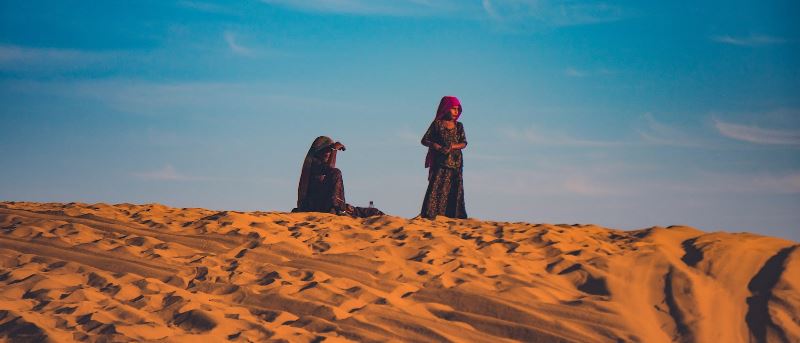 Female Literacy
Female Literacy
Jaisalmer records India's highest national gender literacy gap as Rajasthan remains rearmost in female learning
Children develop character traits like resilience, persistence and perseverance through observing their surroundings. Children learn behaviour by watching and listening to others and mimicking what they see and hear. School is considered the first formal course of action where children are exposed to new ideas to develop their mental, social and physical aspects leading to overall development.
Trends in Literacy Rate
Although there are encouraging developments in India's general literacy rate, the decadal gain has dramatically decreased from 12.62 to 9.21 from 2001 to 2011. Additionally, the gender gap has decreased over the past 10 years, but the rate at which it has declined is a cause for concern. Census of India, 2011
Education in Rajasthan
From the population census of 2001 to 2011, Rajasthan saw an increase in literacy of almost 7 per cent. The last recorded literacy rate is 66.11 per cent as of 2011, up from 60.40 per cent in 2001. In Rajasthan, 80.51 per cent of men (including urban and rural) are literate. In contrast, Rajasthan's literacy rate for females (urban and rural) is 52.66 per cent, reflecting the predominance of men in this state. Despite implementing programmes for women's education and empowerment, as per the NSS report, Rajasthan has India's lowest female literacy rate.
Jaisalmer: District with high literacy gender gap
Jaisalmer, the best tourist destination in Rajasthan, with the most significant area and the lowest population density, is located in western Rajasthan. According to the census of 2011, out of 33 districts in Rajasthan, Jaisalmer’s literacy rate stands at 57.22 per cent, with male and female rates of 72.04 and 32.33 per cent respectively. In the Jaisalmer district of Rajasthan, there is a gender disparity of 32.3 per cent, which is over twice as large as the national average.
Education facilitates knowledge that helps individuals connect to the resources available to them. The education will act as a staircase that will assist individuals in climbing up to the stuffy mango trees of knowledge. Everyone wants to reap the benefit of hard work, hence everyone must climb stairs to reap that desired result. It should be gender agnostic.
Rajasthan ranks at the bottom as far as female education is concerned, with Jaisalmer district having the highest national literacy gender gap. Considering the education level in the Jaisalmer district, access to education is not a genuine concern, but equal access to education is of significant concern.
The Cause
According to a study conducted by the National Statistical Organisation on the survey report, 'Household Social Consumption' (July 2017--June 2018), almost every second woman in Rajasthan's villages cannot read, write or perform simple calculations.
The National Family Health Survey-5 (2019-2021) indicated that 21,800 girls had dropped out of school before 2019-20. Of those, 13 per cent did so because of household work and 7 per cent got married even though child marriage is illegal.
Jaisalmer has multiple small communities; one of them is Bheel Basti (society), whose population is dominated by immigrants from Pakistan, where girls are barred from receiving education. Several girls have been affected by child marriage in this pandemic era of lockdown. Many poor parents with three or four daughters were trying desperately to alleviate their load by getting them married off.
This is not over; worse is that these girls become mothers when they themselves were children and were unaware of anything. Since their husbands were of older age, these girls become pregnant prematurely. Lack of education in society causes children to lose their childhood and bear the burden of family responsibilities at a young age.
Education: Life saviour of girl child in Jaisalmer
Education can bring a paradigm shift in the life of girls. It has been widely observed that educated girls are less likely to marry early, lead healthier and more productive lives, build better futures for themselves and their families, reduce inequality and strengthen economies.
Enthusiasm among women about access to education is very high. They want to be literate and learn income generation skills and are willing to make time for the same. Education enables them to become financially independent and become part of the decision-making process in the house and society.
Way Forward
Meanwhile, the government and numerous organisations tried to mend the situation. The latest one attempted to create a sustainable Rajkumari Ratnavati Girl’s School and Women’s Cooperative in the Jaisalmer Desert to empower women. The government provides a number of resources to help improve the educational system. Despite all these efforts, those girls and women who are unable to go outside are still barred from being educated.
In this patriarchal society where males dominate decision-making, creating awareness about women's education among men will abolish the barriers and automatically facilitate women's education.
Also, to start the process of bringing change in the mindset of the younger generation, a part in the school curriculum regarding the importance of inclusion of all genders in decision making, women's education and the concept of equity in resource sharing.
(The author works for CUTS International, a global public policy research and advocacy organisation. The view expressed in the article is of the writer.)
Support Our Journalism
We cannot do without you.. your contribution supports unbiased journalism
IBNS is not driven by any ism- not wokeism, not racism, not skewed secularism, not hyper right-wing or left liberal ideals, nor by any hardline religious beliefs or hyper nationalism. We want to serve you good old objective news, as they are. We do not judge or preach. We let people decide for themselves. We only try to present factual and well-sourced news.







